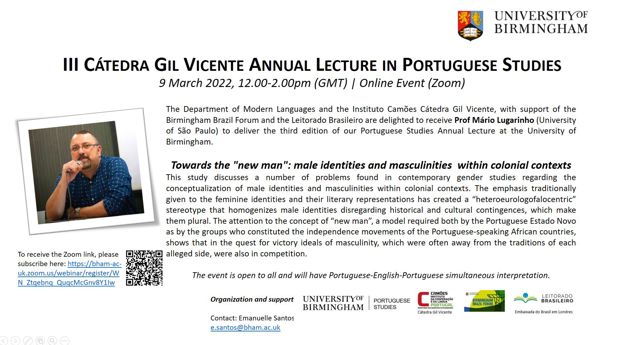III Cátedra Gil Vicente Annual Lecture in Portuguese Studies
- Dates
- Wednesday 9 March 2022 (12:00-14:00)
- Contact
Richard Brunt, International Partnerships Officer, Birmingham Global.
 III Cátedra Gil Vicente Annual Lecture in Portuguese Studies
III Cátedra Gil Vicente Annual Lecture in Portuguese Studies
The Department of Modern Languages and the Instituto Camões Cátedra Gil Vicente, with support of the Birmingham Brazil Forum and the Leitorado Brasileiro are delighted to host Prof Mário Lugarinho (University of São Paulo) to deliver the third edition of our Portuguese Studies Annual Lecture at the University of Birmingham. This online event is open to all and will have Portuguese-English-Portuguese simultaneous interpretation.
(Versão em português no fim da página)
Towards the "new man": male identities and masculinities within colonial contexts
This study discusses a number of problems found in contemporary gender studies when it comes to the conceptualization of male identities and masculinities within colonial contexts. The emphasis traditionally given to the feminine identities and their literary representations has created a “heteroeurologofalocentric” stereotype that homogenizes male identities disregarding historical and cultural contingencies, which make them plural. The attention to the concept of “new man”, a model required both by the Portuguese Estado Novo as by the groups who constituted the independence movements of the Portuguese-speaking African countries, shows that in the quest for victory ideals of masculinity, which were often away from the traditions of each alleged side, were also in competition.
Mário Lugarinho is an Associate Professor in the Literatures of Portuguese-speaking Africa at the University of São Paulo. He is a co-founding member of the Brazilian Association for Homoculture Studies (ABEH) and has published extensively in the fields of African Literatures in Portuguese, Portuguese Literature and Comparative Studies of Portuguese Language Literatures in Brazil, Europe and the USA. Amidst many articles, books chapters and co-edited volumes, he has authored the books Manuel Alegre: mito, memória e utopia (2005), Do inefável ao afável: ensaios sobre sexualidade, gênero e estudos queer (2012) and Uma nau que me carrega: rotas da literariedade em Língua Portuguesa (2013). His areas of interest are Comparative Studies, Postcolonial Studies, Cultural Studies and Queer Studies.
Masculinidade e colonialismo: em direção ao “homem novo”
Este estudo trata de problemas no âmbito dos estudos de gênero contemporâneos no tocante à conceptualização de identidades masculinas e de masculinidades nos contextos coloniais. A ênfase tradicionalmente dada às identidades femininas e às suas representações literárias criou o este-reótipo do “heteroeurologofalocentrismo” que homogeneiza as identidades masculinas sem observar as contingências históricas e culturais que as pluralizam. A atenção ao conceito de “homem novo”, modelo tanto requerido pelo Estado Novo português quanto pelos movimentos de independência dos Países Africanos de Língua Portuguesa, demonstra que na busca pela hegemonia bélica concorriam também ideais de masculinidade, muitas vezes afastados das supostas tradições de cada lado.
Mário Lugarinho é Professor Associado em Literaturas Africanas em Língua Portuguesa na Universidade de São Paulo. Ele é membro cofundador da Associação Brasileira de Estudos da Homocultura (ABEH) e possui uma extensa produção bibliográfica nas áreas de Literaturas Africanas em Língua Portuguesa, Literatura Portuguesa, e Estudos Comparados entre Literaturas de Língua Portuguesa com publicações no Brasil, Europa e Estados Unidos. Entre seus vários artigos, capítulos de livro e volumes co-editados, ele publicou também os livros Manuel Alegre: mito, memória e utopia (2005), Do inefável ao afável: ensaios sobre sexualidade, gênero e estudos queer (2012) e Uma nau que me carrega: rotas da literariedade em Língua Portuguesa (2013). Suas áreas de interesse são os Estudos Comparados, Estudos Pós-coloniais, Estudos Culturais e Estudos Queer.